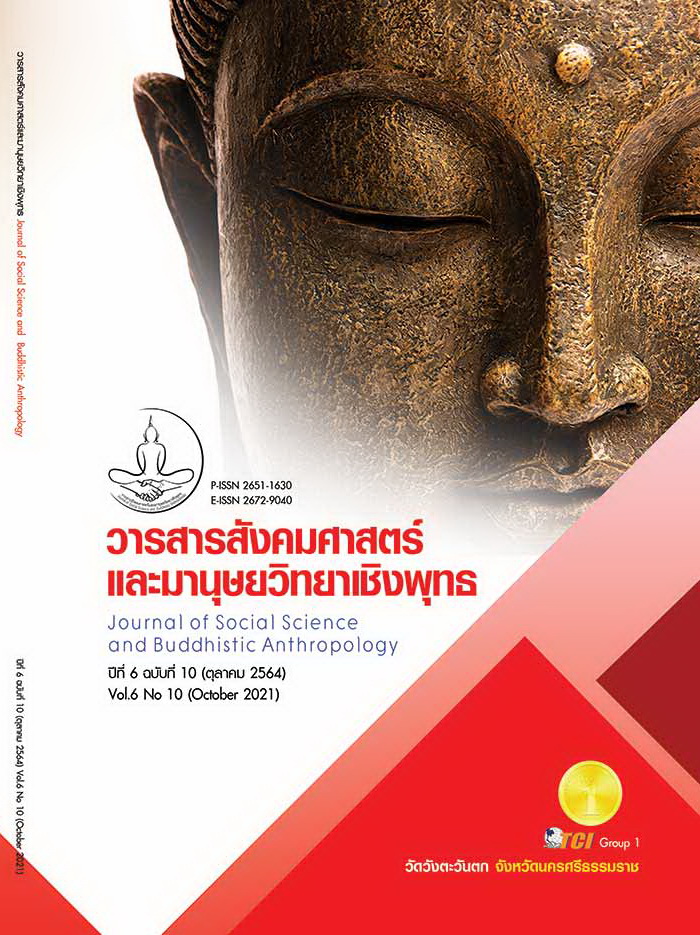A MODEL FOR DEVELOPING SCHOOL ADMINISTRATORS’ LEADERSHIP IN DIGITAL ERA
Keywords:
Leadership, School Administrator, Digital LeadershipAbstract
The objectives of this research article were to conducted through research and development. The main objective was to develop a model for developing school administrators’ leadership in digital era. The researcher undertook the following four steps in order to carry out this research: 1) studied the attributes of school administrator leadership and then analyzed and synthesized the related documents of leadership attributes which was finally approved by five experts, 2) carried out factor analysis of school administrator leadership with samples of 324 administrators and teachers who were selected through multi-stage random sampling method. The instrument used was 5 rating scale questionnaire and the data was analyzed using mean, standard deviation and exploratory factor analysis using factor extraction by principal component analysis and orthogonal rotation by varimax rotation, 3) the model of school administrator leadership in digital era was constructed after the researcher studied, analyzed, and synthesized the related documents of leadership development and approved by five experts. 4) the model was evaluated by 12 experts and the instrument used was an evaluation form of propriety, feasibility, and utility of the model. The data was analyzed using mean and standard deviation. The Research findings show that: the attributes of school administrator leadership consisted of four factors; technological skills, social intelligences, learning skills and create innovation, and managing organization as a whole system. The model for developing school administrators’ leadership in digital era had the principles, the objectives, the goals, the key components, the evaluation, and key success conditions. The propriety, feasibility, and utility of the model were at the highest level.
References
ลือชัย ชูนาคา และวิทยา จันทร์ศิลา. (2559). รูปแบบการพัฒนาสมรรถนะการบริหารวิชาการของผู้บริหารสถานศึกษา สังกัดสำนักงานเขตพื้นที่การศึกษาประถมศึกษา. วารสารศึกษาศาสตร์ มหาวิทยาลัยนเรศวร, 18 (2), 72 - 80.
ศรสวรรค์ พานซ้าย. (2563). แนวทางการพัฒนาภาวะผู้นำการเรียนรู้ของผู้บริหารสถานศึกษา สังกัดสำนักงานเขตพื้นที่การศึกษาพิษณุโลก เขต 1. พิษณุโลก: คณะศึกษาศาสตร์สาร มหาวิทยาลัยนเรศวร.
สมาน อัศวภูมิ. (2561). ทบทวนแนวคิดและวิธีวิจัยเกี่ยวกับรูปแบบและการพัฒนารูปแบบ. วารสารบริหารการศึกษาบัวบัณฑิต, 18 (1), 1-10.
อนุศรา อุดทะ และจิติมา วรรณศรี . (2563). รูปแบบการพัฒนาสมรรถนะของครูปฐมวัย สังกัดองค์กรปกครองส่วนท้องถิ่น. วารสารศึกษาศาสตร์, 22 (4), 305-316.
Bateman, T. S. & Snell, S. A. (2013). Management. (9th Ed). Los Angeles: McGraw-Hill.
Burn, J. M. (2010). Leadership. in Hickman, G.R.(Editor). Leading Organizations:Perspectives for A New Era. Los Angeles: SAGE.
Clerkin, C. . (2016). Creative Leadership and Social Intelligence: The keys to leading in thedigital age. in Matthew Sowcik & others (Editors). Leadership 2050: Critical Challenges, Key Contexts, and Emerging Trends. Bingley: Emerald Group Publishing Limited.
Dubrin, A. J. (2010). Principles of Leadership. (6rd Ed.). Australia: South-Western.
Garland, V. E. & Tadeja, C. (2013). Educational Leadership and Technology: Preparing School Administrators for a Digital Age. New York: Routledge.
Johansen, B. (2012). Leaders Make the Future: Ten New Leadership Skills for an Uncertain World. (2 nd Ed.). San Francisco: Berrett-Koehler Publishers.
Kaplan, L. S. & Owings, W. A. (2017). Organizational Behavior for School Leadership: Leveraging your school for success. New York: Routledge.
Marzano, R. J. et al. (2005). School Leadership That Work: from research to results. Alexandria, Virginia: ASCD publications.
Qian, H. et al. (2017). Global Trends and Issues in The Development of Educational Leaders. In Michelle D. Young and Gary M. Crow (Editors). Handbook of Research on The Education of School Leaders. New York: Routledge.
Sanzo, K. (2016). Strategies for Developing and Supporting School Leader: Stepping Stones to Great Leadership. New York: Routledge.









